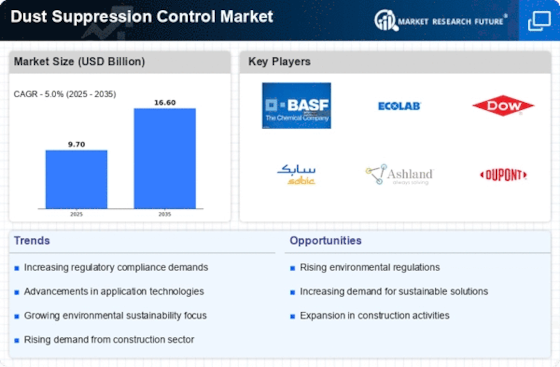Top Industry Leaders in the Dust Suppression Control Market
 The dust suppression control market, valued at $9.2 billion in 2022, is projected to reach $14.6 billion by 2032, fueled by growing environmental concerns and stricter regulations. This competitive landscape is marked by a diverse range of players, each employing unique strategies to capture market share. Here's a breakdown of the key aspects:
The dust suppression control market, valued at $9.2 billion in 2022, is projected to reach $14.6 billion by 2032, fueled by growing environmental concerns and stricter regulations. This competitive landscape is marked by a diverse range of players, each employing unique strategies to capture market share. Here's a breakdown of the key aspects:
Market Share Drivers:
-
Product Innovation: Players are constantly developing new technologies and solutions to address specific dust challenges. Examples include advanced foam cannons, bio-based dust suppressants, and mobile dust suppression units. -
Price Competitiveness: Balancing affordability with quality is crucial in attracting customers, especially in cost-sensitive industries. Efficient production processes and competitive pricing strategies are key. -
Regional Focus: Adapting products and services to cater to specific regional regulations and environmental conditions is essential. Players with strong regional expertise gain a competitive edge. -
Sustainability: Growing demand for eco-friendly solutions is driving the adoption of biodegradable dust suppressants and water-efficient technologies. Players with sustainable practices attract environmentally conscious customers. -
Customer Service: Providing excellent customer service, including technical support, training, and after-sales support, fosters customer loyalty and repeat business.
Competitive Landscape:
The dust suppression control market is fragmented, with a mix of global players like Dow Chemical and BASF, regional players like AkzoNobel and CemenTech, and niche players specializing in specific technologies or applications. Each player adopts unique strategies to compete:
-
Global players: Leverage their extensive research and development capabilities, economies of scale, and established distribution networks to offer a wide range of products and solutions. -
Regional players: Focus on specific regional regulations and market needs, providing tailored solutions and building strong relationships with local customers. -
Niche players: Innovate in specific technologies or applications, catering to specialized needs and offering differentiated solutions.
Key Companies in the Dust Suppression Control market include
-
Suez
-
Cargill Inc.
-
Benetech, Inc.
-
Reynolds Soil Technologies Pty Ltd
-
Tetra Technologies
-
Sumitomo Bakelite Co. Ltd.
-
Road Technology International Holdings
-
Ecolab Inc.
-
Solvay SA
-
Borregaard ASA
-
OLAS Group
Recent Developments:
-
August 2023: AkzoNobel introduces a new foam dust suppression technology that significantly reduces water usage compared to traditional methods. -
September 2023: BASF expands its dust suppression product portfolio with a new line of dust suppressants specifically designed for agricultural applications. -
October 2023: CemenTech, a leading dust suppression solution provider, acquires a smaller competitor, strengthening its market position in the construction sector. -
November 2023: The Chinese government announces plans to invest heavily in dust pollution control technologies, creating significant growth opportunities for the dust suppression control market in the region. -
December 2023: A research study reveals that the integration of Internet of Things (IoT) and sensor technology into dust suppression systems is expected to revolutionize the market in the coming years.










